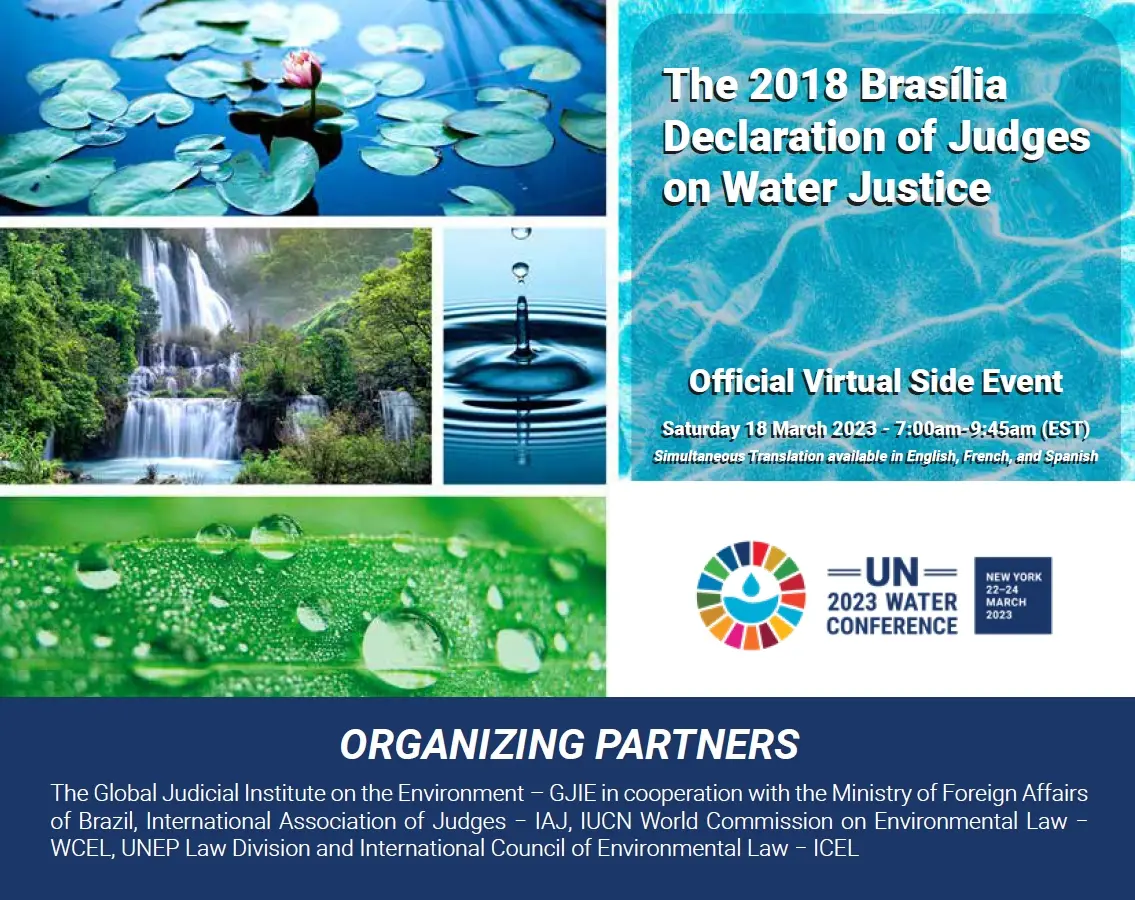
By Babatope Babalobi and Racheal Ogundipe
‘Our courts should recognise the human right to drinking water, as access to water affects basic human activities. And when we are talking on access, we must look at the quantity and quality of water. Judges should protect this right in the scope of collective rights. And when you’re protecting human right to access water, the judicial system must monitor the misuse of access to this water and enforce laws that support the right to water’.
 This were the words of Ricardo Lorenzetti, a Justice of the Supreme Court of Argentina at a virtual side event of the United Nations 2023 Water Conference, today.
This were the words of Ricardo Lorenzetti, a Justice of the Supreme Court of Argentina at a virtual side event of the United Nations 2023 Water Conference, today.
Tagged: ‘Brasília Declaration of Judges on Water Justice [10 Principal Declaration] 8th World Water Forum Brasília (Brazil) 21 March 2018’ the meeting was a precursor to the UN conference kicking off in New York, United States on March 22, 2023.
It was organised by the Global Judicial Institute on the Environment, in conjunction with International Association of Judges, the World Commission on Environmental Law, the United Nations Environmental Programme (UNEP) Law division, and the International Council on Environmental law.
The side meeting reviewed progress being made to implement the Brasilia declaration of Judges on water Justice, one of the outcomes of the World Water Forum held in Brasilia five years ago.
The 2018 declaration encapsulated in 10 principles on the role of Judges and Prosecutors in promoting water justice.
Judges and Prosecutors believe they have a role to play in promoting water justice as they are involved in:
- Administering water justice.
- Adjudicating cases regarding the utilization, management, and protection of all forms of freshwater resources; equitable access to water and sanitation services; the impact of human activities on water and the environment; and restoration of ecological services and functions,
As such, the 2018 declaration:
- Emphasised the importance of ensuring that water law and environmental law feature prominently in academic curricula, legal studies, and training at all levels, among judges and others engaged in the judicial process.
- Canvassed an urgent need to strengthen the capacity of judges, lawyers and all persons who play a critical role at the international, regional, national, and subnational level in the process of development, implementation and enforcement of water and environmental law, especially through the judicial process.
- Suggested collaboration among members of the Judiciary and others engaged in the judicial process within and across jurisdictions as essential to achieving a significant improvement in implementation and enforcement of water law and environmental law.
- Opined that there is a need for water laws to: (a) progress, by being regularly revised and enhanced, and brought up to date, in order to protect, conserve and sustainably use water resources and related ecosystems, based on the most recent scientific knowledge and ethical considerations, and (b) not regress, by allowing or pursuing actions that have the effect of diminishing the legal protection of water resources and related ecosystems
The full declaration is accessible here: https://conexaoagua.mpf.mp.br/atuacao-estrategica/eventos/2018/2018/2018-03-17-forum/2018-03-17-brasilia-declaration-of-judges-on-water-justice.pdf
According to panellists at today’s side meeting:
- The power of the 2018 declaration is not in the words, but what we do with the words.
- The declaration provides practical guidance to Justices within the limit of their jurisdictions on how to implement its 10 principles.
- Justice around the World should be empowered and exposed to the role of the rule of law in environmental protection.
- Today’s meeting provided an opportunity for five years celebration of the declaration which has been described as the voice of Judges on Water Justice.
Key messages that came out of today’s Judges for Water Justice pre UN Water conference side meeting include the following:
- The Judiciary has a role to play in realising the SDGs for WASH, and we need to pay greater attention to water laws – Arnold Kreilhuber, Deputy Director, UNEP Law division.
- Water Justice gives life to the protection of water resources, and environmental law has a transformative power- Terearii Chandler- Lao, Research and Teaching fellow, William Richardson School of Law
- Access to drinking water affects people’s lives and health. Justice should protect the right to water within the scope of collective right. Collective goods belong to the community, and it is for common use – Ricardo Lorenzetti, Justice Supreme Court of Argentina
- Water is the driving force of nature, and we can’t outlive or out smart water- Nicholas Bryner, Professor of Law, Louisiana State University, USA.
- Government must act now rather than acting apiece, and act together. Nothing is softer more than water, yet nothing can resist its – Ayman Cherkaoi, Deputy Chair, Director Hassan II International Center for Environmental Training
Denise Antolini, Professor of law at University of Hawai’i, one of the panellists, summarised the outcomes of the meeting in six key points:
- We have learnt today that there is tremendous power of capacity building of the declaration, and this comes through connecting Justices around the world to act on Water justice.
- Contributions from the panellists have also informed us on how water law and all laws evolve and progresses as a framing and application tool around the world.
- There is profound connection between water law and water justice to all aspects of life.
- We need to have a biocentric perspectives on water justice. This deals with how water law is part of our being.
- Justices have an obligation to champion the Justice declaration and carry the conversation forward.
- The declaration is an incredible template for future work to promote water justice by Judges.
Leave a Reply